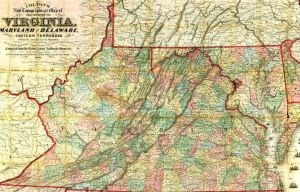 For home front Baptists of the South, life marches on, tension and emotionally-filled that it may be. Sunday worship services and certain other religious ceremonies offer moments of normalcy during a time that is anything but normal.
For home front Baptists of the South, life marches on, tension and emotionally-filled that it may be. Sunday worship services and certain other religious ceremonies offer moments of normalcy during a time that is anything but normal.
One such ceremony is that of the ordination of ministers. Such an event takes place today in Virginia, perhaps not many miles distant to where troops are camped out. Absolem Dempsey Bolton, born December 12, 1828 in Giles County, Virginia, is formally ushered into the fellowship of Baptist pastors in the same county in which he grew up.
“This is to certify that our brother, Absolem D. Bolton, was publicly ordained and set apart for the full work of the gospel ministry, with prayer and laying on of hands by the undernamed Presbytery, according to the usages of the Baptist Church, on December 16, 1861. He was called to ordination by the Big Stony Creek Church, regularly connected with the Valley Baptist Association, of which church he is a member, and which, after full and sufficient opportunity to judge of his gifts, were agreed in their opinion that he was called to the work of the ministry. Our brother was accordingly received with the full and entire approbation of the Presbytery called by the church, and also of the church, in thus entering officially upon the full work of the gospel ministry, and is hereby authorized to administer all the ordinances of the gospel, and to perform all the duties under a minister of Christ, and may the great Head of the Church abundantly bless him in all of his labors, and may he walk worthy the high vocation whereof he has been called.
Given under our hands December 16, 1861.
M. ELLISON,
JOHN B. LEE,
W. R. GITT.”
Bolton, along with his wife and three children, thus enters his ministry years during troublesome times. The details of his ministry during the war years are unknown, although it is safe to say his pastoral duties included comforting families who lost loved ones on distant battlefields, living alongside church members agonizing over questions of good and evil and pondering God’s providence and human will, and struggling to subsist in the darkest days of the war.
Bolton remains in the pulpit throughout the war and until 1899, pastoring numerous congregations in Virginia and then in West Virginia.
Upon his death, his obituary speaks of his faith and accompanying future hope.
His funeral service took place from the Fairview Baptist Church, a discourse being preached by the writer from Acts 11:24: “For he was a good man and full of the Holy Ghost of faith, and much people was added unto the Lord.”
A large gathering of people was present, coming from afar to testify their love for the good man. His remains were laid to rest in the Fairview Cemetery, to wait the blast of the trumpet signaling the great rising and crowning day.
A focus on the future joys of heaven is a continual theme during the war years, as Baptists try to look beyond the horrors unfolding before them — white Baptist soldiers confronting prospects of death find assurance in heavenly peace, while enslaved African Baptists long for a heavenly homes where they will finally be free of shackles, beatings and whippings. In the generations following, Baptists of the South retain vivid visions of heaven as a place where peace and joy awaits for the faithful.
Source: James Henry Miller, Maude Vest Clark, History of Summers County from the Earliest Settlement to the Present Time, Hinton: West Virginia, 1908, pp. 422-423 (link)


